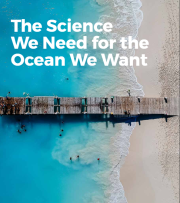13 September 2019, Phuket, Thailand, the three-day WESTPAC Training Workshop on “Delivering Ocean Forecasting Services for Coral Reef Conservation” wrapped up with the promise of further collaboration and data-sharing for advancing the existing SEAGOOS ocean forecasting system to develop early warning for coral reef bleaching. The workshop, attended by around 30 researchers specialized in model development and coral reef conservation, represents an initial effort of the Sub-Commission in advancing solution-oriented multi- and trans-disciplinary research to address the development challenges facing this region.
Coral reefs and their associated ecosystems are of vast social and economic importance to humanity. This region, particularly its Southeast Asian seas, has the highest concentration of coral reef biodiversity in the world. It is home to 75% of all known coral species. A number of recent studies indicated that coral health has been declining over the past few decades owing to anthropogenic and climate impacts. Among other factors, coral reefs are sensitive and vulnerable to sea surface temperature (SST). Thus, it is essential to monitor and predict SST, and develop meaningful alerts on coral bleaching, in order to develop effective long-term mitigation and adaptation strategies.
The workshop featured expert lectures relating to ocean modelling and the status of coral reefs in the region, as well as coral bleaching events and relevant monitoring and research efforts in respective countries such as Indonesia, Malaysia, Thailand, and Viet Nam. Through the presentations and discussions, an understanding was built of the essentials of ocean forecasting and how they can be applied, together with other reference tools, to the development of coral bleaching alerts. A trial version of the Thai Coral Bleaching Alert System, being jointly developed and tested by the Ocean Forecasting System team and PMBC, was also presented as a proof of concept. A hands-on exercise was conducted on the use of Panoply software to process available data in the NetCDF format to generate useful data products.
Through passionate discussions throughout this workshop and the collaboration and data-sharing that can come of it, the system will be further developed to cover a wider regional scale to include Malaysia, Indonesia, and Viet Nam as well. It was particularly highlighted how the coral bleaching alert system can be a policy decision support tool, providing timely information for policymakers, resource managers and scientists to take immediate measures on coral bleaching.
The workshop concluded with commitments from each country to sharing their coral bleaching data and information to further the development of a regional coral bleaching alert system. Participants discussed the details of how and what data would be shared, and how such a process could be streamlined, as well as what further features or requirements such a system should have. The possibility of engaging with the public to assist in collecting more data as a form of citizen science was also explored.
“The Thai National Committee for UNESCO would reiterate our strong support, as we did over the past eight years, for the Sub-Commission’s efforts in assisting Member States to increase research capacity and advance scientific knowledge for sustainable development,” Kanittha Hanirattisai, Deputy Secretary General expressed at the workshop. By building on existing strengths and setting the groundwork towards a regional coral bleaching alert system, this workshop made a positive start of a collaborative and multidisciplinary effort for coral reef conservation.
The event was organized in cooperation with the Phuket Marine Biological Centre and the Thai Department for Marine and Coastal Resources. The Sub-Commission would like to extend its appreciation to the Thai National Commission for UNESCO for its continued financial support for WESTPAC activities.




